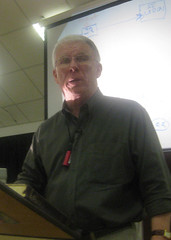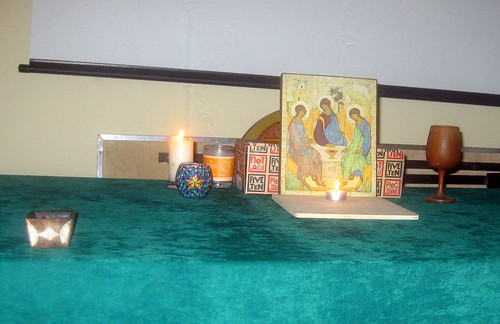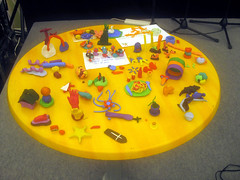Recently
I saw Larry Crabb at the annual conference with the
British Association of Christians in Psychology. Here are some notes that I jotted down at the conference. I hope that I caught the gist of what he was saying and apologies if I have misrepresented him in any way.

Spiritual Direction is an ancient and profound practice within the Christian Church. Larry Crabb has brought this together with counselling and with and an understanding of community. After spearheading the integration of psychology and Christianity he found his journey moving away from psychotherapy and counselling towards Spiritual Direction. He now would say that he doesn’t think anyone can be an expert on relationships. Rather than scientifically trying to develop expert technique he is looking at the art of providing relationship. Trying to provide and engage in conversions that matter to God.
People need direction in their lives. Psychotherapy tries to provide that - but without God. There are many different approaches. Each approach gives different answers each theorist is defensive of and persuasively advocates their view. But practitioners often become eclectic welding together fundamentally incompatible theories. Sometimes it is good to acknowledge these contractions as there is an element of mystery to the human soul. What can you count on a therapist knowing? Ultimately all they can agree on is that when it hurts it helps to talk to someone you trust.
Larry pointed to the Bible as our starting point for understanding psychology. And we should approach the Bible as 66 love-letters written to answer seven questions of spiritual theology. Spiritual theology understands the story God is telling in a way that affects your life.
1. Who is God? A community of three persons
2. What is up to? Glorifying himself by beautifying us
3. Who are we? The image of God
4. What’s gone wrong? Here Larry asked the question ‘are psychological disorders really spiritual disorders?’ i.e. the result of sin, but he acknowledged that this does also raise the question ‘what about hurt’?
5. What has he done about it? The new covenant
6. What’s the Spirit doing now? Forming us into little Christs – into the image of God
7. How do we join him? How can we co-operate as God’s people and learn to relate? Larry discussed the doctrine of
perichoresis which means “to dance around” and one image is that of the Trinity dancing and inviting us to join that dance. This was beautifully conveyed in our worship time on Saturday night where we meditated on one such portrayal of this image.

Larry would now see a lot of the help given by counsellors or therapists could be gained from non-professional relationships. He has learnt a lot about these relationships from medieval Christian writings that discuss Spiritual Direction. A tradition originated from the desert fathers and mothers. When Christianity became acceptable some Christians went into the desert to recapture the radical faith of the earlier martyrs. They needed communities to direct them in discerning what we really of God and what was just wacky.
Spiritual Direction is about developing good conversations. These begin with us honestly sharing ‘where we are at’. There is an epidemic of a lack of sacred curiosity – we don’t ask question of each other enough. Do we communicate ‘shut up while I speak’ or do we intrigue people to ask us more? We often talk to prevent us from feeling inadequate. Instead of thinking of ten good things and saying eleven let us think of ten good things and occasionally mention one.
This addresses the seventh question of spiritual theology, ‘How can we participate in what God is doing?’ By relating to people in conversations that really matter.










